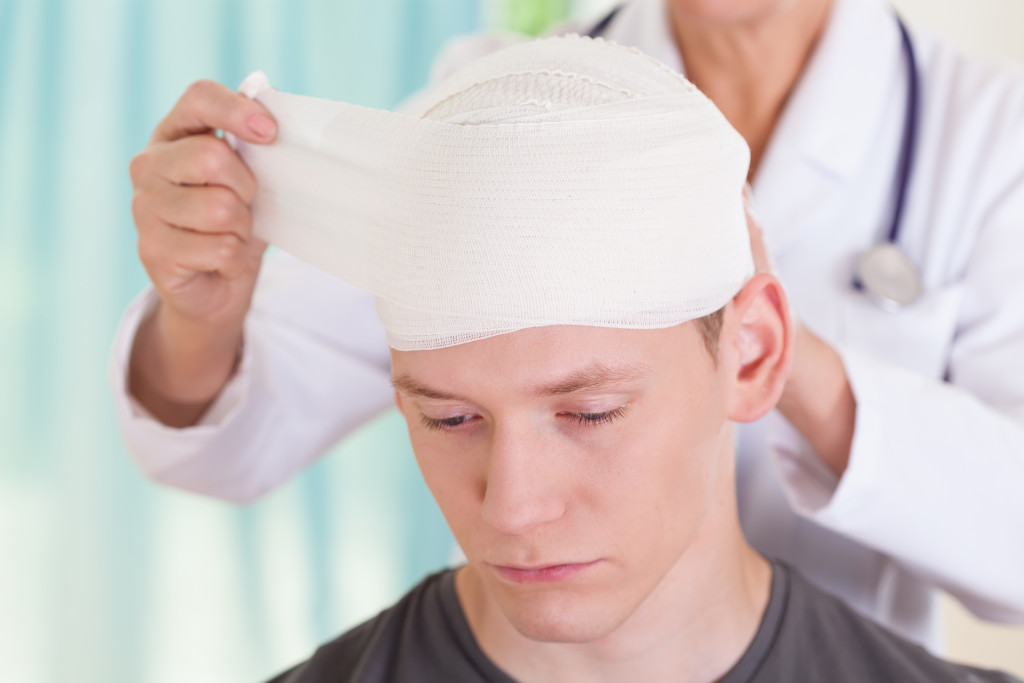People bump their heads all the time. Head injuries are pretty standard whether it is through sports, car accidents, or even just falling. However, not all head injuries are created equal. A concussion is a type of traumatic brain injury (TBI) that can have short- and long-term effects.
According to the Centers for Disease Control and Prevention (CDC), an estimated 1.7 million people suffer a TBI each year in the United States. Of those, 52,000 die, 275,000 get hospitalized, and 1.365 million get treated and released from an emergency department. TBI can get caused by a physical force, blow to the head, or a penetrating head injury. Falls are the leading cause of TBI for all age groups. Falls account for nearly half of all TBI-related deaths in the United States. Motor vehicle crashes are the second leading cause of TBI.
While any head injury should get taken seriously, not all injuries result in a concussion. There will be a few blows that only result in bumps and bruises, not affecting the brain too much. However, you must still watch out for your health because long-term effects could still happen. This can damage the brain cells and create chemical changes in the brain. Not all concussions result in loss of consciousness. Signs and symptoms of a trauma can include headache, dizziness, nausea, vomiting, balance problems, double vision, sensitivity to light or noise, confusion, memory problems, feeling sluggish, emotional changes, and difficulty sleeping. If you suspect someone has a concussion, it is vital to seek medical attention immediately.
Whether you get a concussion or not, these tips are essential for your safety if you bump your head.
Assess the Damage
When you bump your head, it is essential to check on the damage. Assess the injury’s severity and whether you have any common concussion symptoms. If you do, it is crucial to seek medical attention right away.
There are a few home remedies that can help you identify concussion symptoms. For example, if you have a headache, dizziness, nausea, vomiting, balance problems, double vision, sensitivity to light or noise, confusion, memory problems, feeling sluggish, emotional changes, or difficulty sleeping after a head injury, you may have a concussion.
If you are experiencing any of these symptoms, it is essential to rest and avoid any activity that could further injure your brain. You may also want to drink plenty of fluids and eat light foods until your concussion has healed.
If those signs are not present, you still have to be careful. Sometimes, concussion symptoms do not show up right away. If you have any concerns, it is still best to seek medical attention to be safe.
Get Examined by a Medical Professional

If you think you may have a concussion, it is vital to see a medical professional as soon as possible. A doctor will be able to properly diagnose your injury and determine the best course of treatment.
There is no one-size-fits-all approach to treating a concussion. The severity of your symptoms will dictate how long your recovery will take. In most cases, rest and avoiding strenuous activity is the best way to allow your brain to heal.
Sometimes, your doctor may prescribe medication to help relieve pain or other symptoms. In severe cases, hospitalization may be necessary.
It is essential to follow your doctor’s instructions and ensure you get fully healed before returning to normal activities. If you return to action too soon, you risk further injury.
An MRI scan is the standard diagnostic tool for concussions. However, you might not feel comfortable with the enclosed space nature of the procedure. Fortunately, you can find clinics that provide open MRI scanner services to help you get the treatment you need without feeling claustrophobic.
Seek Legal Help If Necessary
In some cases, a concussion can lead to long-term health problems. If someone else’s negligence caused your trauma, you might be entitled to compensation for your medical bills, lost wages, and pain and suffering.
An experienced personal injury lawyer will be able to review your case and help you determine if you have a valid claim. If so, they will fight for the compensation you deserve. The settlement could help you with medical bills, unpaid wages, and recovery treatment.
If you or someone you love has suffered a concussion, don’t hesitate to contact an experienced personal injury lawyer today.
Final Thoughts
It can be scary when you or someone you love suffers a head injury. However, staying calm and following the proper steps is crucial to ensure everyone’s safety. If you suspect a concussion, seek medical attention immediately and follow your doctor’s instructions for a full recovery.




